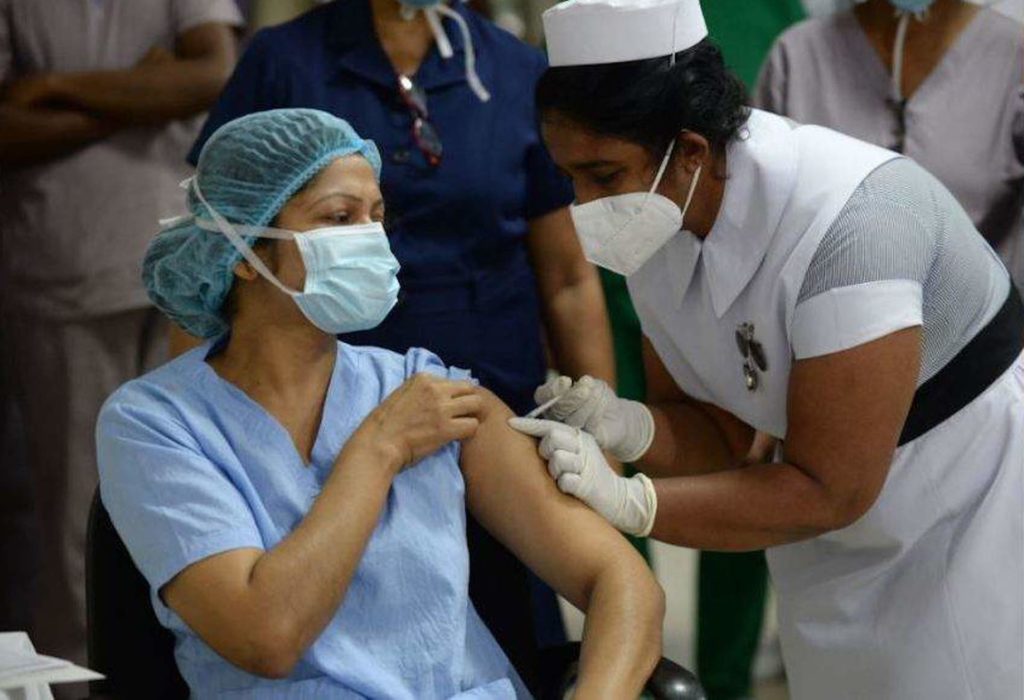Photo courtesy of Newss4u
Sri Lanka is facing an unprecedented surge in COVID-19 cases with the number of daily cases over 3,000, a weekly increase of over 50 percent from last week Friday, May 14. Government officials and ground level reports point towards a health system that is faltering under rapidly increasing case load and healthcare workers under increased pressure. Although vaccinations were initiated in the Western province, we are a long way from reaching 70 percent of the population – coverage that we may need to reach for herd immunity in the country.
Without immediate policy decisions to curb the spread of the virus our health system will collapse causing more deaths, especially of those who are vulnerable. Youth and the vaccinated also face increased risk posed by novel variants of concern such as B.117 and B.1.617.
There are three immediate steps that the government should take to curb the virus spread and support the health system.
- Declare community spread and improve clarity on COVID-19 related communication
Sri Lanka for months has been reluctant to declare community spread. The latest cluster, the ‘New Year Cluster’, categorization follows no known epidemiologic principles such as same location of exposure or being restricted to a geographic region. The ‘New Year Cluster’ is essentially island wide. More recently many government officials have pointed out that there are infected asymptomatic individuals untraced in the community. Thus, for both technical and practical purposes, Sri Lanka has community spread. Declaring community spread will help create much needed awareness and vigilance at personal, organizational and policy levels to take action than when guided by unclear language about the status of the virus spread.
The government also urgently needs to improve its communication around COVID-19. A joint cabinet spokesperson stated to the public media that different vaccines can be mixed, which is harmful, unscientific and has the potential to cost lives. Thus, the government should appoint a media point person who has the knowledge of the disease and the health system and advise politicians who lack awareness to refrain from commenting. Additionally, there is a strong need to minimize confusion related to COVID-19 communication, for example, lack of clarity on travel restrictions will only lead to violations of the restrictions. This is a time filled with uncertainty and fear; if we are to manage panic and help the public, we need to be honest by declaring community spread, be effective by having a clear communication strategy and not try to silence those who can shed light on the challenges we face on the ground, such as healthcare workers.
- Conduct a needs assessment, provide data and transparent avenues to contribute
The health system is struggling. Many reports indicate that high numbers of patients are overwhelming the system and healthcare workers are getting infected. Many requests have been made for funds, equipment, oxygen and support. COVID-19 related needs requests have been scattered, some via government sources and some via social media. To not have a clear official needs assessment and a credible avenue to contribute is very alarming at a time when our health system is on the verge of collapsing. The government, therefore, needs to provide an official needs assessment of what is needed urgently and what is needed for the medium and long term management of COVID-19. This information, coupled with credible avenues to support such as links to credible organizations, government or private credible funds that are transparent, will provide avenues for individual citizens, diaspora communities and organizations to contribute. Providing transparency around how Itukama fund was utilized and how the World Bank support and other donations were spent will also help build credibility and garner more support in this time of desperate need.
- Vaccination and public health measures
Vaccination drives, and public health measures together are the only ways to control this pandemic. The more we lag behind in vaccination and public health measures the higher the mortality rate will be. Additionally, uncontrolled spread of the virus will give way to more emerging variants with the potential to override the protection offered via vaccines. Therefore unambiguous, immediate public health measures are needed. These measures should include at minimum a 14 day complete lockdown measures (barring essential services), surge in testing and making testing available at low cost or free for the population. In the same time frame, we need to step up our vaccination drives, using mainstream media and government portals such as the health promotion bureau site to announce the locations, dates and capacity. For example, having 200 people in line when 50 vaccines are available will only result in creating high risk environments where the disease can spread. We also need to prioritize high risk communities such as Free Trade Zone workers, workers in the apparel industry and other frontline workers if we are to effectively curb the spread of the virus.
These policy decisions have been effective and have helped save lives in many other countries. While the economy is important, prioritizing the economy in the short term can have dire economic impacts in the long term. These impacts include high morbidity and mortality in our workforce, high expenditure in government healthcare to address complications of long COVID and other demands due to a collapsed health system, and adverse impact on families who may lose their breadwinners. Our measures need to be proactive and not reactive. Delaying these policy decisions will cost lives, cost money and cost the overall wellbeing of Sri Lanka. The time to act is now, a week or a month from now will be too late.
The author is formerly a Policy Associate at the Center for Policy Impact at the Duke Global Health Institute and is currently a Ph.D. candidate focusing on global health policy at McGill University. He tweets at @ShashikaLB
